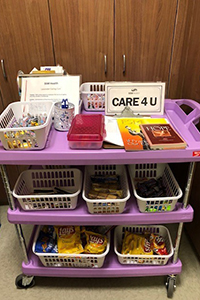By PATRICIA CORRIGAN
May 18, 2020
Updated May 19, 2020
Well before the current pandemic began, SSM Health was developing a "healthy work and wellness framework" that speaks to a broader definition of wellness by offering holistic self-care strategies for body, mind and spirit. The goal was to enhance employee health at work and at home and also to help individuals live up to their true purpose in life.

Schmidt
"That's how we define wellness," said Dr. Heather P. Schmidt, system medical director of Healthy Work and Wellness. "We'd spent six to 12 months on our overall strategy — and then along comes Covid-19, which has changed the world as we know it." Schmidt also is a medical advisor to Fond Du Lac Country Public Health and co-chair of the Living Well FDL Coalition.
"Right away, we put everything in high gear, as we asked ourselves, 'Do we want to survive in this crisis — or thrive.'" Clearly, SSM Health has opted to thrive. Schmidt shared specifics on May 13 at the first of four 45-minute sessions of "Our Well-Being: A Webinar Series Sharing Wellness Resources."
The webinar series, which runs weekly on Wednesdays through June 3, will share "Catholic Health Association member practices and additional trusted wellness resources, practices and programs to help all involved in Catholic health care identify and address their immediate needs, as well as the post-COVID reality." The webinars are free to CHA members, but preregistration is required.
Dennis Gonzales, senior director, mission innovation and integration for CHA, is facilitating the series, which is presented by CHA. A recording of the webinar and handouts are available to members on the CHA website.
How can we help?
"We asked ourselves, 'How do we approach this crisis in a way that meets the needs of our workforce?'" Schmidt said. "We've looked at how to help meet basic physical and financial needs related to safety and security, how to buffer our workforce psychologically from the impact and how to help our support people get the resources they need to take care of themselves."
Like their peers at many other health care systems, Schmidt and her colleagues considered how to reach out effectively to the people doing frontline work to determine whether staffing was sufficient, if needed resources and supplies were on hand and how to approach Covid-19 screening, a topic for which guidelines have frequently changed. Schmidt said the goal was to communicate frequently without overloading the staff. They also looked at how to expand communication with employees "in an honest and vulnerable way," she said.

A 'lavender cart' is stocked with snacks and good wishes for employees.
Discussions about what happens next also have been on the agenda. "How do we prevent psychological damage or a mass exodus from health care" by staff, Schmidt asked. "We've looked at interventions among everyone, in large groups, small groups and also one-on-one, and we're working to increase awareness of our Employee Assistance Program."
"Lavender carts" filled with tools for staff support are used in many SSM Health locations by leaders, behavioral health professionals and spiritual care services/mission leaders reaching out to frontline staff. The carts hold snacks, balloons, thank-you cards and other expressions of gratitude, including letters from staff or community members. Schmidt said one SSM Health ministry set up a spiritual support hotline for employees during the pandemic. There also is a support group for chaplains, who can use it to talk about the stress of providing support to hospitalized patients and staff.
Group stress debriefings
Small groups of leaders can take part in "kitchen table chats," video meetings convened three to five times a week. Participants join as their schedules allow. The meetings are recorded so anyone can listen later. Likewise, leaders host "coffee talks" to pull together their teams working virtually. Virtual support groups meet to discuss such topics as anxiety, anger and even how it feels to be a hero. "Sometimes it's hard to be a hero," Schmidt said. "Normalizing emotions is critically important."
Informational webinars and educational town halls also can help meet the needs of larger groups. Schmidt mentioned virtual Schwartz Rounds, as a "safe place where people can talk." Connections with virtual Masses or prayer services also are helpful.
"Wellness reminders" are included in the COVID-19 screening process at the start of an employee's shift because they are part of the strategy too, Schmidt said. "It's important to eat well, sleep well, move your body. We all meet stress better when we're healthy. In addition to checking temperatures, there could be voluntary questions about meals, sleep and relationships." Also, she noted that the American Medical Association has launched a "Coping with COVID-19" survey every four to six weeks, and SSM Health plans to partner with the AMA on the survey as well "to gauge how we're doing in the long term."
Establishing and maintaining effective communication are challenges, Schmidt said. "It's like drinking from a firehose, with hundreds of emails arriving each day. How do we communicate what we're learning in a way that people can hear this overwhelming amount of information?" Schmidt emphasized that in the current climate, it's okay to "over communicate."
Assessing the impact of information is another challenge. "How do we make sure we are meeting social, emotional and psychological needs? We want to make sure we are responding by designing things people need, not just what we think they need. Designing resources with people is always more effective than designing for them," Schmidt said.
Key during this troubling time is a secure leadership commitment. "Create a network of wellness champions, people passionate about taking care of each other and of our patients," Schmidt advised. "Also, a good communication process is one that expresses gratitude — you can never be too grateful — and recognition. You also need clear updates on evidence and next steps. Let your behavioral health experts lead the way. They can really help us."
Wellness as a team sport
She added, "If you can do only one thing to take care of your community, your patients, your staff and your providers, I recommend that you view wellness as a team sport. Build relationships to empower leaders and staff. Ask what people need, and listen with compassion while recognizing that stress and emotions are running high. Support each other any way possible. Relationships matter most."
She said a study released recently confirmed that health care providers are not great at reaching out, "so, we need to address the barriers," she said. "Mental health is so critical." Stigma reduction, education and campaigns can also help health care workers reach out about their need for support. Schmidt noted that studies have shown that supportive relationships can and do help people get through tough times.
The second well-being webinar, "Providence St. Joseph Health Whole Persons Caring for Whole Persons" will take place at 2 p.m. Eastern Time on May 20. The speakers, both from Providence St. Joseph Health in Renton, Washington, will be Dougal G. Hewitt, and Debra A. Canales. He is executive vice president and chief mission officer and she is executive vice president and chief administrative officer.